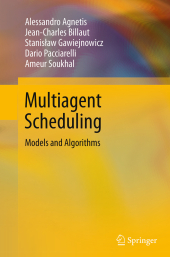 Neuerscheinungen 2016Stand: 2020-02-01 |
Schnellsuche
ISBN/Stichwort/Autor
|
Herderstraße 10
10625 Berlin
Tel.: 030 315 714 16
Fax 030 315 714 14
info@buchspektrum.de |

Alessandro Agnetis, Jean-Charles Billaut, Stanislaw Gawiejnowicz
(Beteiligte)
Multiagent Scheduling
Models and Algorithms
Softcover reprint of the original 1st ed. 2014. 2016. xiii, 271 S. 55 SW-Abb. 235 mm
Verlag/Jahr: SPRINGER, BERLIN; SPRINGER BERLIN HEIDELBERG 2016
ISBN: 3-662-50635-1 (3662506351)
Neue ISBN: 978-3-662-50635-6 (9783662506356)
Preis und Lieferzeit: Bitte klicken
This book presents multi-agent scheduling models in which subsets of jobs sharing the same resources are evaluated by different criteria. It discusses complexity results, approximation schemes, heuristics and exact algorithms.
Scheduling theory has received a growing interest since its origins in the second half of the 20th century. Developed initially for the study of scheduling problems with a single objective, the theory has been recently extended to problems involving multiple criteria. However, this extension has still left a gap between the classical multi-criteria approaches and some real-life problems in which not all jobs contribute to the evaluation of each criterion.
In this book, we close this gap by presenting and developing multi-agent scheduling models in which subsets of jobs sharing the same resources are evaluated by different criteria. Several scenarios are introduced, depending on the definition and the intersection structure of the job subsets. Complexity results, approximation schemes, heuristics and exact algorithms are discussed for single-machine and parallel-machine scheduling environments. Definitions and algorithms are illustrated with the help of examples and figures.
1. Multiagent Scheduling Fundamentals.- 2. Problems, Algorithms and Complexity.- 3. Single Machine Problems.- 4. Batching Scheduling Problems.- 5. Parallel Machine Scheduling Problems.- 6. Scheduling Problems with Variable Job Processing Times.- References.
"It is very readable and precisely written. The major results are proved and 43 algorithmic descriptions are provided. The book contains also several numerical examples to illustrate the presented solution approaches. The book is recommended not only for researchers and practitioners working in scheduling, but also for graduate students since only basic knowledge in discrete mathematics, complexity theory, algorithms, and programming languages is required." (Frank Werner, Mathematical Reviews, May, 2017)


